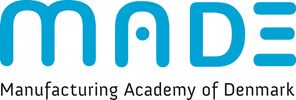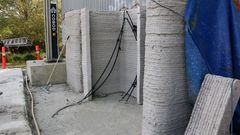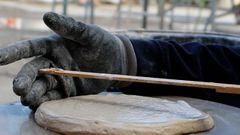Gypsum walls cutting CO2 emissions by 85 percent are being 3D-printed at Nordhavnen
27.10.2025 13:29:31 CET | MADE | Pressemeddelelse
The startup Rumett has developed a new gypsum blend which, according to the startup, has an 85 percent smaller CO2-footprint compared to concrete. The plan is to use it in an enormous 3D printer for fast rebuilds in post-war areas such as Syria. Early tests look promising.
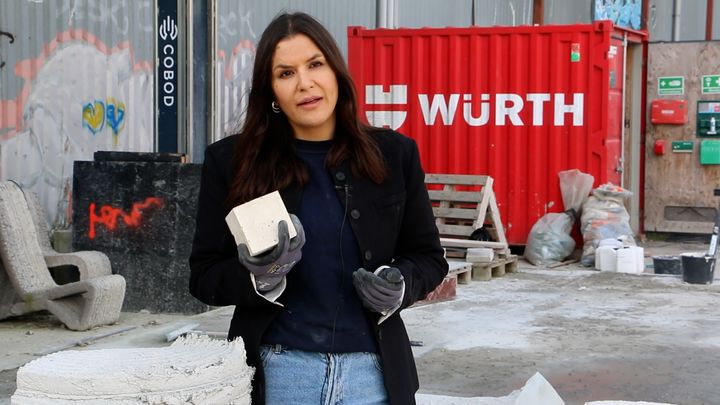
In Nordhavnen, Copenhagen, a metal giant rises from the concrete desert: two colossal posts with a beam stretched between them, lowering over odd test constructions and scattered building materials.
From a printhead at its center, a thick gray paste seeps out, stacking itself in precise ribbons—layer upon layer until a small piece of a wall takes shape.
We will be the first company to introduce gypsum for full, turnkey projects with wall perimeters on a large scale
Diana Saleh, CEO & Founder, Rumett
“We will be the first company to introduce gypsum for full, turnkey projects with wall perimeters on a large scale (red. in 3D print),” says CEO and founder at Rumett, Diana Saleh, smiling.
Traditionally, 3D construction printing uses various cementitious mortars, but Rumett wants to introduce a special gypsum blend. Currently, they try to find just the right balances in their mix, testing how to tweak it with additives and adjust the print itself making small changes in the parameters.
According to Saleh, the blend has an 85 percent lower CO2 profile compared to concrete, cures seven times faster, and requires no post-finishing.
Rising demand in the Middle East
The main selling points of 3D construction printing are rapid construction, reduced waste, and affordable housing requiring fewer workers. The main downsides are high energy demands and a high upfront cost for the 3D printing setup.
Nonetheless, Dubai aims to be at the forefront of the development:
“Our key goal is to ensure that 25 percent of buildings in Dubai are based on 3D printing technology by 2030, and we will raise this percentage with the development of global technology as well as growth of market demand,“ the Vice-President and Prime Minister of the UAE and Ruler of Dubai, H.H. Sheik Mohammad, is quoted on the governments website.
This reflects a growing market for 3D printing in construction, which is forecasted to grow from around USD 3.5 billion in 2022 to around USD 523.3 billion in 2030, as explained in a report by AM Hub, which has gathered knowledge and cases on their site about the subject.
Diana is originally from Lebanon but has grown up in Denmark. However, her knowledge of the Arabic language has proved to be a huge advantage, as not only Dubai but the entire MENA region presents great market opportunities for the 3D-printed large-scale building projects.
“They are building a lot right now, and they are building fast. It is also in the Middle East where COBOD has sold the majority of their 3D-printing machines, so this is our market,” Saleh says.
The firm COBOD, which Saleh refers to, specializes in large-scale 3D-printed constructions, and the tests with Rumett are made possible through the Future Manufacturers startup program and funding from Verner Overgaards Familiefond.
Opportunity for post-war and disaster reconstruction
The fast and cheap process makes 3D construction printing especially interesting for refugee housing and disaster response.
Because of the blend’s fast cure, the biggest technical challenge is to “keep the material alive” to avoid the 3D-printing system from “clogging,” as COBOD’s Materials specialist Padmini Rajaram notes.
Yet it is also one of the biggest advantages because it enables much faster building.
“After the civil war in Syria (…) there’s a need for fast reconstruction for such a big country that has been really deconstructed for a long war time,” Saleh says, adding that Rumett has partnered up with the Danish Embassy on a rebuilding project in Syria.
Next step
COBOD has worked with many cement mixes but is fascinated by the new opportunities in Rumett’s gypsum formula – its exact composition remains a secret.
“It is special, I must say (…) Looking at gypsum as only one material – is pretty new. And we would like to explore more,” Rajaram clarifies.
So far, the results from the tests are positive.
According to COBOD and Rumett, the blend runs smoothly through the COBOD printing system and holds its shape after being built.
“It looks promising,” Rajaram highlights, and Saleh adds that Rumett is ready for the next steps after the first tests with COBOD are finished:
“We have identified a couple of potential pilot projects and construction entrepreneurs that are super interested in the product.”
Future Manufacturers
I Future Manufacturers får startups hjælp til at gå fra prototype til produktion.
Bag indsatsen står MADE, DI Produktion og Industriens Fond, som har bevilget 4,5 mio. kr. til programmet.
COBOD International
COBOD is a 3D construction printing firm specializing in robotic construction technology.
It was founded around 2018 and has its headquarters in Nordhavnen, Copenhagen.
Their key products are the 3D construction printers: BOD2 and BOD3 which have sold more than 50 units across multiple continents.
Rumett
Rumett was founded in 2020 by Diana Saleh and her brother Taha Saleh.
The startup’s mission is to create new material compositions using plaster and gypsum to create sustainable alternatives to current building materials.
Nøgleord
Kontakter
Julie Lykke-NedergaardKommunikationsrådgiverMADE
Kommunikerer bredt resultater i MADE og arbejder særligt med projekterne Takeback Strategier, REACT og Future Manufacturers.
Josua Ekberg RavnholdtKommunikationsrådgiver
Kommunikerer bredt resultaterne i MADE med særligt fokus på projekterne REACT, Recirkuler rustfrit stål og Recirkuler elektronik.
Billeder
Links
MADE - Danmarks produktionsklynge
MADE – Manufacturing Academy of Denmark – er Danmarks produktionsklynge og en non-profit forening bestående af virksomheder, uddannelses- og vidensinstitutioner samt GTS-institutter. MADE samler de danske aktører inden for produktion for at skabe og implementere fremtidens bæredygtige løsninger.
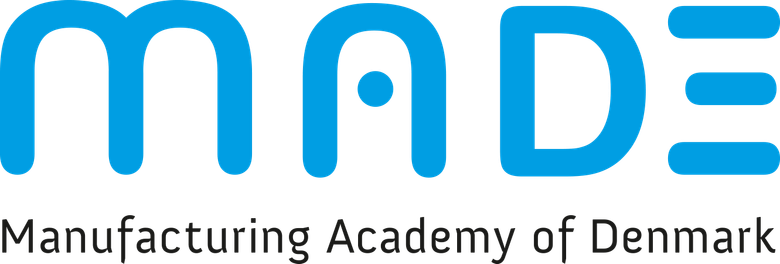
Følg pressemeddelelser fra MADE
Skriv dig op her, og modtag pressemeddelelser på e-mail. Indtast din e-mail, klik på abonner, og følg instruktionerne i den udsendte e-mail.
Flere pressemeddelelser fra MADE
AI-løsning fjerner flaskehals hos Johannes Pedersen Maskinfabrik5.2.2026 13:22:24 CET | Pressemeddelelse
Maskinfabrikken Johannes Pedersen og startuppen DeepVis har slået pjalterne sammen i et MADE-projekt for at opnå vigtige tidsbesparelser med AI og visionteknologi til kontrol af mange tusinde emner. Det åbner for større ordrer og et nyt marked.
Bæredygtigt alternativ til plast: ”Nu kan vi 3D-printe urner af valnøddeskaller”22.1.2026 08:55:05 CET | Pressemeddelelse
Det er muligt at omdanne valnøddeskaller til bionedbrydelige urner med 3D-print. Nuterials har i et MADE-projekt fået hjælp til at teste deres løsning, og de lovende resultater giver startuppen helt nye markedsmuligheder.
”De helt rigtige mennesker”: Særligt fællesskab gør iværksættere mere produktionsmodne og bæredygtige25.9.2025 09:15:53 CEST | Pressemeddelelse
Siden januar 2024 har over 40 startups i programmet Future Manufacturers fået en bro ind i det producerende Danmark. Ifølge en ny undersøgelse har det gjort dem mere produktionsmodne – og for det store flertal forretningen grønnere. Nøglen er et fællesskab med ”de helt rigtige mennesker” til at hjælpe iværksætterne videre.
Insutex vinder Bedste Bæredygtige Startup-Idé og 25.000 DKK25.8.2025 10:48:31 CEST | Nyhed
Insutex vinder 25.000 DKK for Den Bedste Bæredygtige Startup-Idé for deres innovative isoleringsmateriale af tekstilaffald. Nu er det tid til at bevise produktets værdi.
Forskningssamarbejde skaber milliardgevinster i industrien21.8.2025 08:30:00 CEST | Pressemeddelelse
En ny undersøgelse viser, at et MADE-forskningssamarbejde med forskere, teknologieksperter og virksomheder skaber gevinster for over halvanden milliard kroner i dansk produktion.
I vores nyhedsrum kan du læse alle vores pressemeddelelser, tilgå materiale i form af billeder og dokumenter samt finde vores kontaktoplysninger.
Besøg vores nyhedsrum